Advance CTE and ECMC Foundation are excited to introduce the Fellows of the third cohort of The Postsecondary State Career Technical Education (CTE) Leaders Fellowship at Advance CTE—Sponsored by ECMC Foundation. The Advance CTE — ECMCF Fellows include representation across multiple demographic categories reflecting the Fellowship’s goal of intentionally building a postsecondary leadership pipeline for underserved populations in Career Technical Education (CTE) that closes racial representation gaps and removes equity barriers to postsecondary leadership advancement.
Over the next few days, this blog series will introduce each Fellow participating in the third cohort of emerging leaders from across 16 states and one U.S. territory.
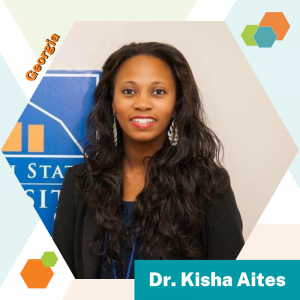 Dr. Kisha Aites serves as the interim department chair/associate professor of engineering technology education in the College of Education at Savannah State University. She holds degrees in technology education from North Carolina A&T State University and a doctorate degree in workforce education from Penn State. Dr. Aites was part of the 2022–2023 USG Executive Leadership Institute and served as Vice Chair of Faculty Senate from 2019-2021. In 2015, she served as editor for the publication Introduction to Critical Issues in Education and was honored by the Georgia Association for Engineering & Technology Education in 2015 and 2016. She has traveled globally, including to Ghana (Fulbright-Hays Fellow) in 2016 and China (GA Education Delegation) in 2017, to explore and promote educational and cultural exchanges. Dr. Aites is dedicated to addressing equity issues in engineering technology, workforce development, and critical issues in education.
Dr. Kisha Aites serves as the interim department chair/associate professor of engineering technology education in the College of Education at Savannah State University. She holds degrees in technology education from North Carolina A&T State University and a doctorate degree in workforce education from Penn State. Dr. Aites was part of the 2022–2023 USG Executive Leadership Institute and served as Vice Chair of Faculty Senate from 2019-2021. In 2015, she served as editor for the publication Introduction to Critical Issues in Education and was honored by the Georgia Association for Engineering & Technology Education in 2015 and 2016. She has traveled globally, including to Ghana (Fulbright-Hays Fellow) in 2016 and China (GA Education Delegation) in 2017, to explore and promote educational and cultural exchanges. Dr. Aites is dedicated to addressing equity issues in engineering technology, workforce development, and critical issues in education.
 NiñaFe Awong is an experienced CTE professional with over 19 years of experience in workforce development, educational leadership, and project management. NiñaFe’s primary mission has been to align CTE programs with industry needs. She has developed and implemented robust statewide initiatives, policies, and programs that drive student achievement and prepare learners for high-wage, high-skill, and in-demand careers. NiñaFe has also effectively managed federal and state funding, while successfully navigating complex legislative and regulatory landscapes, ensuring compliance and delivering measurable outcomes. NiñaFe has helped to refocus organizational lenses to recognize and reprioritize CTE at local and state levels. As a product of CTE education, she strongly advocates student-centered learning, supports instructor development, and believes in forging strategic partnerships that enrich educational experiences. NiñaFe is passionate about removing barriers and creating opportunities for learners to thrive and excel in their chosen careers.
NiñaFe Awong is an experienced CTE professional with over 19 years of experience in workforce development, educational leadership, and project management. NiñaFe’s primary mission has been to align CTE programs with industry needs. She has developed and implemented robust statewide initiatives, policies, and programs that drive student achievement and prepare learners for high-wage, high-skill, and in-demand careers. NiñaFe has also effectively managed federal and state funding, while successfully navigating complex legislative and regulatory landscapes, ensuring compliance and delivering measurable outcomes. NiñaFe has helped to refocus organizational lenses to recognize and reprioritize CTE at local and state levels. As a product of CTE education, she strongly advocates student-centered learning, supports instructor development, and believes in forging strategic partnerships that enrich educational experiences. NiñaFe is passionate about removing barriers and creating opportunities for learners to thrive and excel in their chosen careers.
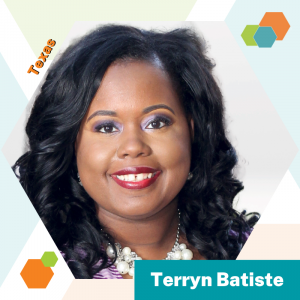 Terryn Batiste leadership of administration and daily operations of third-party accreditations, along with industry-recognized credentials. Her career includes working in the areas of public policy, enrollment management, accreditation, and compliance. Batiste holds two degrees from Southern University and A&M College — a Bachelor of Arts degree with honors in mass communications and a Master of Public Administration from the Nelson Mandela School of Public Policy. She holds a project management professional (PMP) certification from the Project Management Institute and a Developing a Curriculum (DACUM) certification from The Ohio State University. She is married with two children (boy/girl twins).
Terryn Batiste leadership of administration and daily operations of third-party accreditations, along with industry-recognized credentials. Her career includes working in the areas of public policy, enrollment management, accreditation, and compliance. Batiste holds two degrees from Southern University and A&M College — a Bachelor of Arts degree with honors in mass communications and a Master of Public Administration from the Nelson Mandela School of Public Policy. She holds a project management professional (PMP) certification from the Project Management Institute and a Developing a Curriculum (DACUM) certification from The Ohio State University. She is married with two children (boy/girl twins).
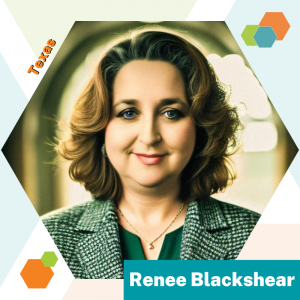 Renee Blackshear is an esteemed professor specializing in computer networking at Texas State Technical College. With degrees in networking, e-commerce and security, her research focuses on the security and scalability of network infrastructures, addressing critical issues in data transmission and internet protocols. Ms. Blackshear’s career spans over 15 years, during which she has continuously helped develop curriculum for emerging technology and has presented at a number of national conferences. Her passion for teaching extends beyond the classroom, where she mentors students and collaborates with industry experts to innovate network technologies. Recognized for her expertise in network design and optimization, she actively contributes to shaping the next generation of networking professionals. Ms. Blackshear’s commitment to bridging theory with practical application has earned her accolades for fostering a dynamic learning environment and preparing students for the evolving challenges of the digital age.
Renee Blackshear is an esteemed professor specializing in computer networking at Texas State Technical College. With degrees in networking, e-commerce and security, her research focuses on the security and scalability of network infrastructures, addressing critical issues in data transmission and internet protocols. Ms. Blackshear’s career spans over 15 years, during which she has continuously helped develop curriculum for emerging technology and has presented at a number of national conferences. Her passion for teaching extends beyond the classroom, where she mentors students and collaborates with industry experts to innovate network technologies. Recognized for her expertise in network design and optimization, she actively contributes to shaping the next generation of networking professionals. Ms. Blackshear’s commitment to bridging theory with practical application has earned her accolades for fostering a dynamic learning environment and preparing students for the evolving challenges of the digital age.
 Ignacio Chaparro is a Pre K-16 equity-focused educational professional with a robust background in leadership, systems building, and strategic policy development and implementation. He is currently pursuing his doctorate in educational leadership and policy studies at Boston University. Ignacio also holds a Master of Public Administration from Northeastern University, and a Bachelor of Arts in Political Science from the University of Massachusetts Boston. As the College and Career Readiness & Pathways Liaison at the Massachusetts Department of Elementary and Secondary Education (DESE), Ignacio provides direct support to districts across the state with implementation of high-quality college and career pathways. His previous roles include serving as the director of equity and accountability at Boston Public Schools, and as project specialist for the Massachusetts Department of Higher Education.
Ignacio Chaparro is a Pre K-16 equity-focused educational professional with a robust background in leadership, systems building, and strategic policy development and implementation. He is currently pursuing his doctorate in educational leadership and policy studies at Boston University. Ignacio also holds a Master of Public Administration from Northeastern University, and a Bachelor of Arts in Political Science from the University of Massachusetts Boston. As the College and Career Readiness & Pathways Liaison at the Massachusetts Department of Elementary and Secondary Education (DESE), Ignacio provides direct support to districts across the state with implementation of high-quality college and career pathways. His previous roles include serving as the director of equity and accountability at Boston Public Schools, and as project specialist for the Massachusetts Department of Higher Education.
To learn more about the Fellowship, the Fellows of Cohort 3, and the alumni of the Fellowship, please visit https://careertech.org/what-we-do/initiatives/postsecondary-state-cte-leaders-fellowship/


 Some states focus on a broad strokes approach that expands access to the sector as a whole. Last year,
Some states focus on a broad strokes approach that expands access to the sector as a whole. Last year,  Other states developed more focused career-specific pathways in close collaboration with industry partners.
Other states developed more focused career-specific pathways in close collaboration with industry partners. 

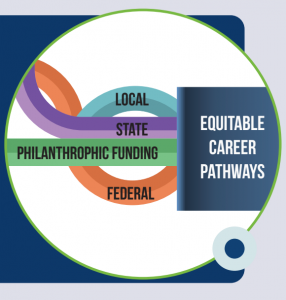 Identify New Funding Streams and Processes.
Identify New Funding Streams and Processes. Please visit
Please visit 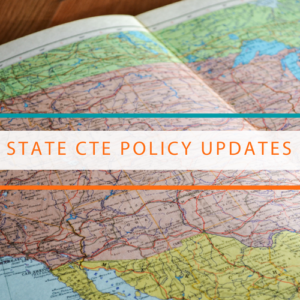 As the new year unfolds, 38 governors across the nation have delivered their much-anticipated
As the new year unfolds, 38 governors across the nation have delivered their much-anticipated  For further insights and resources connected to workforce development, check out our Learning that Works Resource Center.
For further insights and resources connected to workforce development, check out our Learning that Works Resource Center.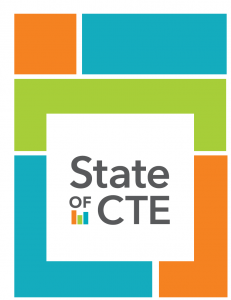 States make significant contributions to CTE programs through non-categorical, line item appropriations. Programmatic funding is distributed through periodic, legislatively established authorizations that are contingent on the availability of funds. States often place conditions on how money should be spent or used to promote state priorities. Additionally, a programmatic line item appropriation can be a recurring or a one-time investment. This blog highlights appropriations in industry-recognized credentials, Career Technical Student Organizations (CTSOs), career advisement, and educator preparation for fiscal year (FY) 2022. You can read more about categorical funding in the first blog in this series,
States make significant contributions to CTE programs through non-categorical, line item appropriations. Programmatic funding is distributed through periodic, legislatively established authorizations that are contingent on the availability of funds. States often place conditions on how money should be spent or used to promote state priorities. Additionally, a programmatic line item appropriation can be a recurring or a one-time investment. This blog highlights appropriations in industry-recognized credentials, Career Technical Student Organizations (CTSOs), career advisement, and educator preparation for fiscal year (FY) 2022. You can read more about categorical funding in the first blog in this series, 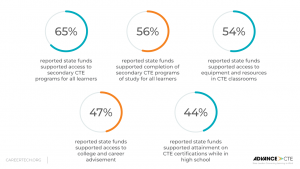
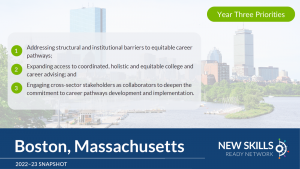
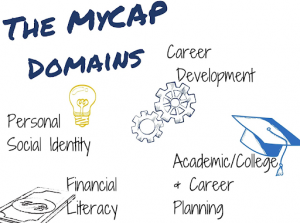 In expanding access to college and career advising, Boston Public School members of the initiative’s
In expanding access to college and career advising, Boston Public School members of the initiative’s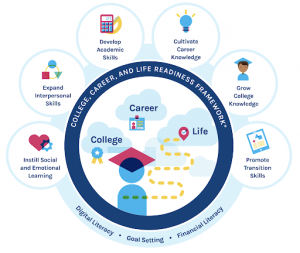 Implementing MyCAP with fidelity across Boston Public Schools requires sustainable and deepened staff capacity at the district’s central office as well as at the school level. Marsha and Erin both support cultivating and maintaining strategic partnerships across the district to align with MyCAP priorities. The collaboration and partnerships during this first year of expanded access to middle-grade learners included leveraging family liaisons who support informing learners and families of opportunities within Boston Public Schools and activating counselor teams that support caseloads of learners in the middle grades. The project team also expanded its reach to include community partnerships that operate in the college and career areas to better serve middle-grade learners. The advantage of bringing these partnerships into the fold allowed greater support for learners with exposure to skills and experiences that support college and career readiness and success (see image).
Implementing MyCAP with fidelity across Boston Public Schools requires sustainable and deepened staff capacity at the district’s central office as well as at the school level. Marsha and Erin both support cultivating and maintaining strategic partnerships across the district to align with MyCAP priorities. The collaboration and partnerships during this first year of expanded access to middle-grade learners included leveraging family liaisons who support informing learners and families of opportunities within Boston Public Schools and activating counselor teams that support caseloads of learners in the middle grades. The project team also expanded its reach to include community partnerships that operate in the college and career areas to better serve middle-grade learners. The advantage of bringing these partnerships into the fold allowed greater support for learners with exposure to skills and experiences that support college and career readiness and success (see image). 
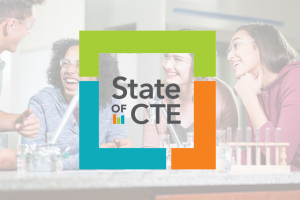
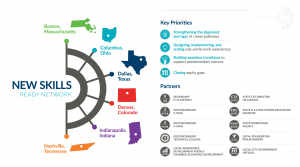
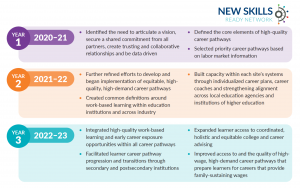
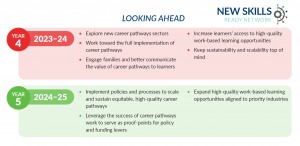
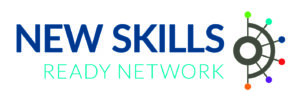 As part of ongoing blog topics providing updates on this initiative, Deshaun Mars, Vice President, Global Philanthropy (Job Skills,) and Brice Thomas, Policy Associate engaged in a discussion to highlight JPMC’s view of the initiative and how this work advances JPMC’s philanthropic portfolio and ultimately building high-quality local and state career pathway systems.
As part of ongoing blog topics providing updates on this initiative, Deshaun Mars, Vice President, Global Philanthropy (Job Skills,) and Brice Thomas, Policy Associate engaged in a discussion to highlight JPMC’s view of the initiative and how this work advances JPMC’s philanthropic portfolio and ultimately building high-quality local and state career pathway systems.